UNEP participation in the European Development Days 2021
Discussion details
The European Development Days (EDD) is Europe’s leading annual forum for international cooperation and development. Convened by the European Commission, the EDD brings the development community together each year to share ideas and experiences in ways that inspire new partnerships and innovative solutions to the world’s most pressing challenges. EDD 2021's title was "The Green Deal for a Sustainable Future”. This year’s EDD edition took place on 15 and 16 of June and was held fully digitally.
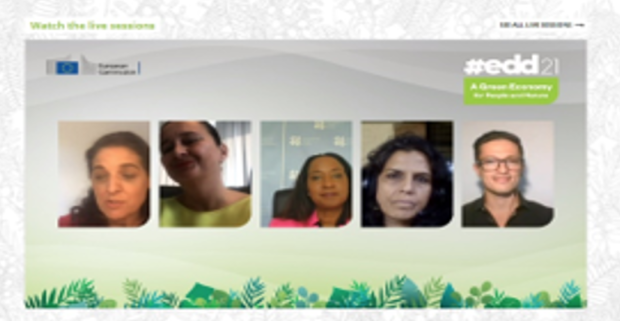
This article summarizes UNEP’s contributions to the EDD programme. The following paragraphs cover the sessions that were (co-) organized by UNEP or had speakers from UNEP, and touch upon the main points made by our experts.
Day 1 Tuesday 15 June
Fast Forward: New Business models for a green and circular recovery (HL) was a high-level panel that followed the opening of the EDDs. Organised jointly by the International Trade Centre and UNEP, the discussions focused on the need for urgent action to fine-tune and scale-up new patterns of consumption and production. The speakers proposed specific solutions to deliver successfully on the European Green Deal and Sustainable Development Goal 12 . Topics included the role of sustainable consumption in the European Green Deal, stressing the impact of purchasing decisions of EU citizens on the environment and on the livelihoods of individuals in third countries.
The panelists put forward innovative initiatives, in particular, at the EU level – such as the EU Cities for Fair and Ethical Trade Award.– References were made to ingredients for sustainable trade such as traceability, transparency and the climate resilience of value chains. Sheila Aggarwal-Khan, UNEP Director of Economy Division, underlined that the climate crisis and the loss of biodiversity are amongst the biggest threats to development. However, if we transform the way we are consuming and producing goods and move to a circular economy and to the sustainable usage of ciment, aluminium, steel, plastics and food, we can achieve efficiency of 70% of CO2 emissions reductions, said Ms Aggarwal-Khan. To achieve this circular model she highlighted the key role of financial actors that enable green models, the importance of building institutional structures and capacities that engage public and private actors, and finally the crucial role of trade to deliver international cooperation and achieve a green shift. Watch the recording here.
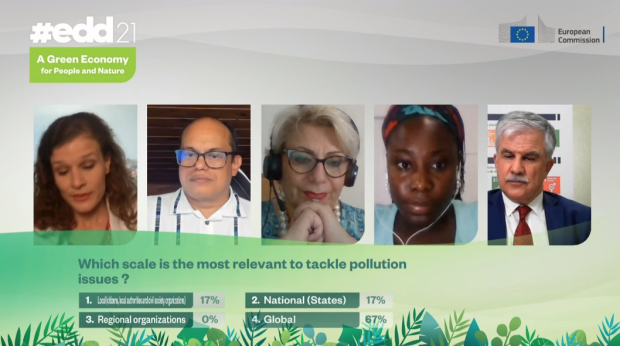
A second high-level discussion on the first day of the EDDs was A zero pollution ambition for a toxic-free environment , organised by the French Ministry for Europe and Foreign affairs. Rolph Payet, Executive Secretary of Secretariat of the Basel, Rotterdam and Stockholm Conventions, spoke about the role of international agreements for the sound management of chemicals. The Secretariat of the Basel, Rotterdam and Stockholm Conventions is hosted by UNEP and cooperates and collaborates with UNEP on a large range of issues to deliver the Convention’s programmes of work..
Rolph Payet explained the synergy between the three conventions, highlighted the current legislative challenges and said that the international community is developing a new framework for the sound management of chemicals and waste beyond 2020, and may launch negotiations on a legally-binding agreement on plastics at the 5th United Nations Environment Assembly (UNEA-5) in February 2022.
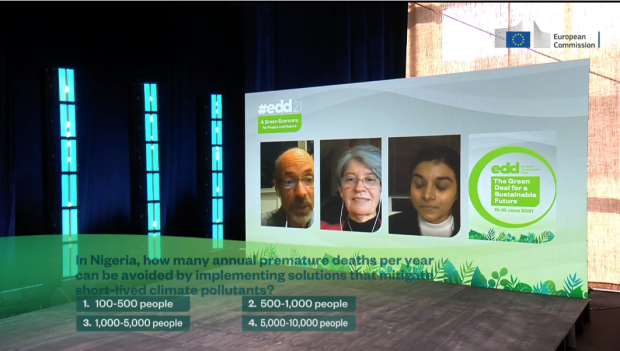
The lab debate Save Lives, Protect Food and Slow Climate Change – all at once also on 15 June, was moderated by Drew Shindell, Climate and Clean Air Coalition’s Special Representative for Action on Methane and Chair of Science Advisory Panel. The Secretariat of the Climate and Clean Air Coalition (CCAC) is hosted by UNEP and the Coalition serves as a forum for assessing progress in addressing the challenge of short-lived climate pollutants and for mobilizing resources to accelerate action.
Drew Shindell explained why climate and air are intrinsically linked and how reducing short-term air pollutants could deliver rapid climate relief and quantifiable benefits in terms of jobs, health and investments. The panel highlighted that strategies to jointly address air pollution and climate change have shown to be cost-effective, could be implemented now, and, importantly, could yield results by 2030. Watch the recording here.
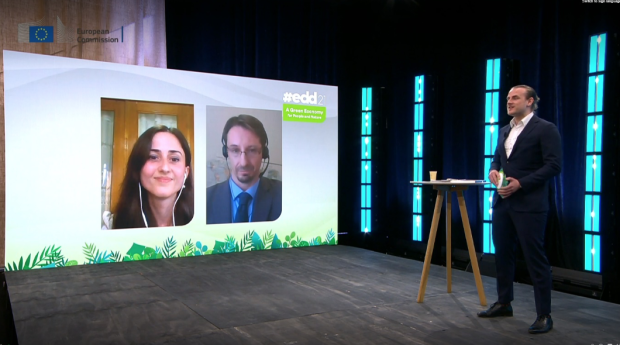
The 10-minute Agora session “Integrated Water Resources Management to accelerate progress on the SDGs” , also on 15 June, showcased how Integrated Water Resources Management (IWRM) is pivotal to achieving a host of SDG targets and climate-related goals. The Agora was co-organized by the Global Water Partnership in cooperation with UNEP and Cap-Net. It was moderated by Colin Herron, Global Coordinator, Water Solutions for the SDGs Global Water Partnership who stressed that no climate objectives could be achieved without IWRM. “Global Water Partnership, with our partners at UNEP, UNEP-DHI Centre and Cap-Net, are operating the SDG 6 IWRM Support Programme. We do this in three stages: 1.Bringing stakeholders together from all sectors, helping them to identify opportunities and challenges around water management; 2.Designing multi-stakeholder action plans to move ahead on those challenges; and 3.Implementing those plans over a period of years, in a way that generates measurable progress on the SDGs,” said Colin Herron. Watch the recording here
Another insightful 10-minute session hosted by UNEP and Siemens Stiftung (Foundation) took place on the first day of the EDDs, entitled Sharing and Circular Economy: Introducing E-Mobility Business Models for Sub-Sahara Africa (Simens Agora)
Speakers shared best practices on E-Mobility and discussed how electric bikes can enhance economic capacities, unlock local production and provide environmental friendly transport solutions for rural African communities. Siemens Stiftung (Foundation) and UNEP presented learnings and failures from introducing 2-wheelers (e-cargo bikes, e-motorbikes) and e-outboard engines to Kenya and Uganda. Watch the recording here
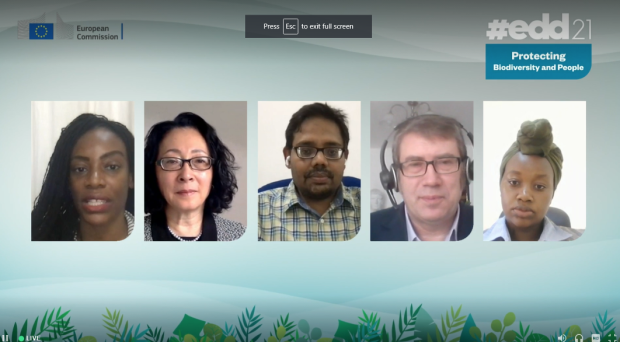
On 16 June, the Partnership for Environment and Disaster Risk Reduction (PEDRR), UNEP,UNDRR and Wetlands International co-organised the high level session ‘Are natural solutions fit for climate only?’ with speakers from the European Bank for Reconstruction and Development (EBRD), Wetlands International South Asia, EDD Young Leader from Kenya and the UN Disaster Risk Reduction (UN DRR). Ms Mami Mitzutori, Special Representative of the UN Secretary-General for DRR opened the event with the launch of a new report “Words into Action Guide: Nature-based Solutions for Disaster Risk Reduction” produced in collaboration with UNEP and PEDRR.
She described the planet as being on its knees facing 3 planetary crises. Yet, “Nature is one of our strongest allies to tackle some of the worlds’ greatest risks,” she said. Nature-based solutions for disaster risk reduction should be seen as cost-effective win-win, and include ecosystem-based mitigation, eco-disaster risk reduction and green infrastructure she added.
Speakers from India and Kenya gave examples on the ground of how to build nature-centred disaster resilience in communities. Ritesh Kumar from Wetlands International South Asia, spoke of coastal communities in India frequently hit by cyclones and how the pathway and entry point of resilience building for them, will be around development issues. If people have no food, it’s hard to convince them of the need for natural solutions, he said. The EDD Young Leader from Kenya, Joan Tonui, observed that communities need to be involved in law- and policymaking; and in order to be successful the local communities need to see the income and economic benefits and understand the rationale behind natural solutions. Alexander Hadzhivanov from the EBRD noted that it makes economic sense for businesses and financial institutions to finance Nature-based Solutions (NbS) and advocated for the scaling up of nature-positive solutions towards projects with a biodiversity gain. The panelists also discussed what an average person can do to promote and invest in NbS; and highlighted the different perspectives in developed and developing countries. Mami Mizutori suggested that we need to start educating ourselves about what happened in developed countries to avoid repeating the same mistakes in terms of unsustainable development. Alexander Hadzhivanov added that NbS in developing countries are fascinating, built on centuries-tested approaches with proven success aligned with nature and biodiversity. These need support and promotion in order to be scaled up, he said. Ms Mizutori concluded “NbS do not happen naturally. We need to make them happen and scale them up together.”
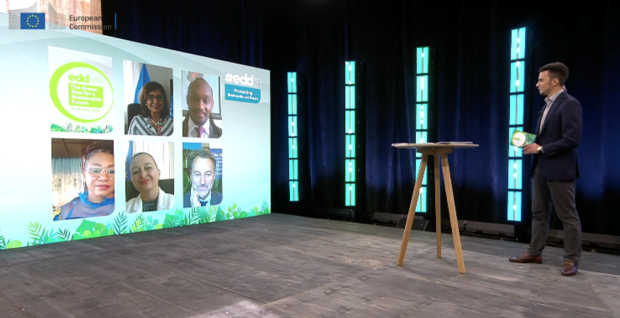
Finally, the high-level panel organised by FAO entitled Forests are too precious to lose: halting deforestation & enhancing biodiversity also took place on the second day of the EDDs and was moderated by the Head of UN-REDD Programme Mario Boccucci. Within the UN-REDD Programme, UNEP leads on private sector engagement, safeguards, knowledge management and communications. The panel painted deforestation and forest degradation as the key contributors to greenhouse gas emissions and biodiversity loss. Speakers stressed food security, sustainable agriculture and forestry must be addressed together, otherwise the global agreements on sustainable development, climate change and biodiversity will not be met. “We are entering a decade during which we need to massively scale-up solutions” said Mario Boccucci. He also highlighted that we were not starting from zero as the international community had been working for decades on forest solutions for years, however, we still needed to tailor those global solutions to the local context and empower on-the-ground actors by boosting financing opportunities, he added.
Watch the recording here.
Throughout the 2 day conference, UNEP also contributed to the Global Village stands on : “Greening Latin America and the Caribbean” and “Working with Nature to Reduce Disaster Risk and Adapt to Climate Change”, as well as a UN Stand.
UNEP also co-organised a side event on the evening of 15 June with the screening of “The Great Green Wall” to mark the launch of the UN Decade on Ecosystem Restoration and the World Day to Combat Desertification and Drought.
Log in with your EU Login account to post or comment on the platform.